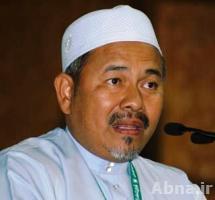(Ahlul Bayt News Agency) - PAS has questioned the government's latest crackdown on Shia teachings, saying the move seemed to carry a sinister goal of bringing disunity within the Islamic party which will hold internal elections in November.
PAS information chief Tuan Ibrahim Tuan Man (pic) was reacting to several statements by UMNO leaders linking PAS to the spread of Shiism - the school of thought followed by about one-fifth of the Muslim world - among local Muslims.
For several weeks now, Islamic bureacrats have been harping on the so-called Shia threat, with no less than UMNO secretary-general Tengku Adnan Tengku Mansor urging Shia followers "to return to the true teachings of Islam", while claiming several quarters in PAS were practising Shia Islam.
This development comes amid a rise of sectarian tension in the Middle East driven by a battle of proxies involving Gulf regimes in the Syria conflict.
Tuan Ibrahim, while saying PAS remained followers of the predominant Sunni Islam, said the party would welcome evidences to prove claims of Shia members within its ranks.
He however explained that having ties with Iran, a predominantly Shia Muslim nation, or the Lebanese political party Hizbullah, did not mean that one was a Shi'ite Muslim.
"The ties that some party leaders have with the Iranian leadership or Middle East Islamic movements such as Hizbullah do not mean they are Shi'ites.
"If that is the case, what about those including the government who have ties with the Zionists?" asked Tuan Ibrahim, referring to revelations of secret communications and trade ties between BN and Israeli leaders.
Tuan Ibrahim also reminded the government of its continued inaction on Qadiyani teaching, a sect long considered deviant by both Sunni and Shia scholars.
He also warned that the accusations against PAS were being hurled in time for party polls this November, where some analysts said sectarianism was being exploited by irresponsible delegates in campaigning for top posts.
He added that PAS's enemies had already created many labels to encourage disunity, including attempts to divide leaders into ulama, professionals, liberals, 'Erdoganists' and Shi'ites.
"Remember, everyone under the PAS umbrella is part of the big united family of PAS," he stressed.
/129
PAS information chief Tuan Ibrahim Tuan Man (pic) was reacting to several statements by UMNO leaders linking PAS to the spread of Shiism - the school of thought followed by about one-fifth of the Muslim world - among local Muslims.
For several weeks now, Islamic bureacrats have been harping on the so-called Shia threat, with no less than UMNO secretary-general Tengku Adnan Tengku Mansor urging Shia followers "to return to the true teachings of Islam", while claiming several quarters in PAS were practising Shia Islam.
This development comes amid a rise of sectarian tension in the Middle East driven by a battle of proxies involving Gulf regimes in the Syria conflict.
Tuan Ibrahim, while saying PAS remained followers of the predominant Sunni Islam, said the party would welcome evidences to prove claims of Shia members within its ranks.
He however explained that having ties with Iran, a predominantly Shia Muslim nation, or the Lebanese political party Hizbullah, did not mean that one was a Shi'ite Muslim.
"The ties that some party leaders have with the Iranian leadership or Middle East Islamic movements such as Hizbullah do not mean they are Shi'ites.
"If that is the case, what about those including the government who have ties with the Zionists?" asked Tuan Ibrahim, referring to revelations of secret communications and trade ties between BN and Israeli leaders.
Tuan Ibrahim also reminded the government of its continued inaction on Qadiyani teaching, a sect long considered deviant by both Sunni and Shia scholars.
He also warned that the accusations against PAS were being hurled in time for party polls this November, where some analysts said sectarianism was being exploited by irresponsible delegates in campaigning for top posts.
He added that PAS's enemies had already created many labels to encourage disunity, including attempts to divide leaders into ulama, professionals, liberals, 'Erdoganists' and Shi'ites.
"Remember, everyone under the PAS umbrella is part of the big united family of PAS," he stressed.
/129

